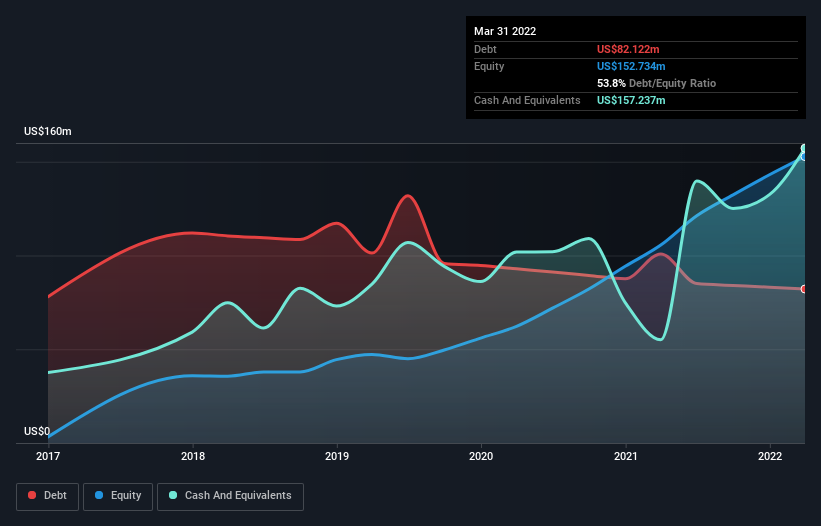Is International Money Express (NASDAQ:IMXI) A Risky Investment?
The external fund manager backed by Berkshire Hathaway's Charlie Munger, Li Lu, makes no bones about it when he says 'The biggest investment risk is not the volatility of prices, but whether you will suffer a permanent loss of capital.' It's only natural to consider a company's balance sheet when you examine how risky it is, since debt is often involved when a business collapses. We note that International Money Express, Inc. (NASDAQ:IMXI) does have debt on its balance sheet. But is this debt a concern to shareholders?
What Risk Does Debt Bring?
Generally speaking, debt only becomes a real problem when a company can't easily pay it off, either by raising capital or with its own cash flow. Ultimately, if the company can't fulfill its legal obligations to repay debt, shareholders could walk away with nothing. However, a more frequent (but still costly) occurrence is where a company must issue shares at bargain-basement prices, permanently diluting shareholders, just to shore up its balance sheet. Of course, the upside of debt is that it often represents cheap capital, especially when it replaces dilution in a company with the ability to reinvest at high rates of return. When we examine debt levels, we first consider both cash and debt levels, together.
See our latest analysis for International Money Express
How Much Debt Does International Money Express Carry?
You can click the graphic below for the historical numbers, but it shows that International Money Express had US$82.1m of debt in March 2022, down from US$100.9m, one year before. But it also has US$157.2m in cash to offset that, meaning it has US$75.1m net cash.
How Healthy Is International Money Express' Balance Sheet?
We can see from the most recent balance sheet that International Money Express had liabilities of US$113.7m falling due within a year, and liabilities of US$83.2m due beyond that. Offsetting this, it had US$157.2m in cash and US$87.3m in receivables that were due within 12 months. So it can boast US$47.6m more liquid assets than total liabilities.
This short term liquidity is a sign that International Money Express could probably pay off its debt with ease, as its balance sheet is far from stretched. Simply put, the fact that International Money Express has more cash than debt is arguably a good indication that it can manage its debt safely.
On top of that, International Money Express grew its EBIT by 31% over the last twelve months, and that growth will make it easier to handle its debt. There's no doubt that we learn most about debt from the balance sheet. But it is future earnings, more than anything, that will determine International Money Express's ability to maintain a healthy balance sheet going forward. So if you're focused on the future you can check out this free report showing analyst profit forecasts.
But our final consideration is also important, because a company cannot pay debt with paper profits; it needs cold hard cash. International Money Express may have net cash on the balance sheet, but it is still interesting to look at how well the business converts its earnings before interest and tax (EBIT) to free cash flow, because that will influence both its need for, and its capacity to manage debt. During the last three years, International Money Express produced sturdy free cash flow equating to 63% of its EBIT, about what we'd expect. This cold hard cash means it can reduce its debt when it wants to.
Summing up
While we empathize with investors who find debt concerning, you should keep in mind that International Money Express has net cash of US$75.1m, as well as more liquid assets than liabilities. And it impressed us with its EBIT growth of 31% over the last year. So is International Money Express's debt a risk? It doesn't seem so to us. There's no doubt that we learn most about debt from the balance sheet. However, not all investment risk resides within the balance sheet - far from it. For example, we've discovered 1 warning sign for International Money Express that you should be aware of before investing here.
When all is said and done, sometimes its easier to focus on companies that don't even need debt. Readers can access a list of growth stocks with zero net debt 100% free, right now.
Have feedback on this article? Concerned about the content? Get in touch with us directly. Alternatively, email editorial-team (at) simplywallst.com.
This article by Simply Wall St is general in nature. We provide commentary based on historical data and analyst forecasts only using an unbiased methodology and our articles are not intended to be financial advice. It does not constitute a recommendation to buy or sell any stock, and does not take account of your objectives, or your financial situation. We aim to bring you long-term focused analysis driven by fundamental data. Note that our analysis may not factor in the latest price-sensitive company announcements or qualitative material. Simply Wall St has no position in any stocks mentioned.

 Yahoo Finance
Yahoo Finance 
